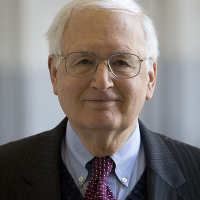Testimony as Prepared
Read the Full Transcript>>>
Tiananmen at 25: Enduring Influence on U.S.-China Relations and China’s Political Development
Mr. Chairman, Senator Sherrod Brown, Mr. Co-Chairman, Congressman Chris Smith, distinguished Commissioners. I am honored to have this opportunity to appear before this Commission to discuss my experience as U.S. Ambassador to China in the aftermath of Tiananmen, the impact that event has had on U.S.-China relations (then and now), and my views on the best way to pursue human rights diplomacy with China. It is a pleasure for me to appear before this Commission together with my friend and colleague, former U.S. Ambassador to China Winston Lord.
My views on the human rights situation in China in the period after Tiananmen are contained in the human rights reports which the embassy annually submitted to Washington. As the Deputy Assistant Secretary of State responsible for China in the Reagan administration and briefly in the first Bush administration, I was deeply involved in Chinese affairs from October 1986 through President George H.W. Bush’s visit to China in February 1989. Beginning in March 1989, I was the Executive Secretary of the State Department for the next two years and no longer had any policy responsibilities for China until I arrived in Beijing as the U.S. ambassador in August 1991.
Three impressions struck me immediately on my return to China in 1991. First was the widespread availability of consumer goods that had been in short supply during my first assignment in Beijing from 1978 to 1981. This was a direct result of the price reforms that had been introduced in the mid-1980s.
Second was the shift in attitude on the part of Chinese who had been sympathetic to the goals of the student demonstrators in Tiananmen Square in the spring of 1989. Overwhelmingly, I encountered the view, based on hindsight, that the demonstrators had been too uncompromising in their approach and had set back the cause of political reform in China. This was quite separate from the question of whether the Chinese government had been justified in using force to quell the demonstrators. While the Chinese government strongly defended the position that it had acted appropriately in June 1989, I did not encounter this view in non-official circles.
Third, I was struck by the degree to which images of China in the United States were out of touch with the realities on the ground. This was less evident during my first year in Beijing, but it became glaringly obvious during the summer and fall of 1992, when the economic reform forces in China strengthened their position and strongly reaffirmed China’s pre-Tiananmen reform and openness policies at the 14th Congress of the Chinese Communist Party in October 1992. By the spring of 1993, Americans were flocking back to China in growing numbers. Without exception those who met with me expressed shock and amazement that conditions in China were so much better than they had been led to believe by the U.S. media. Never before or since in my nearly half century of experience representing the United States abroad did I encounter such a large gap between perception and reality.
This perception gap related to conditions of life in China in terms of the rising levels of prosperity, the openness of society, the freedom of movement, and the access to information. It did not relate to the human rights situation in China, which remained oppressive. During my assignment as US ambassador in Beijing, the Chinese government was no more willing to accommodate political dissent than before and moved quickly to suppress any forms of political or social organization that did not have government authorization. This had a negative impact on organizations such as the Falungong, as well as the house churches, which operated outside the government-approved framework for organized religion. Within that framework, however, membership in religious organizations was rapidly expanding and churches were overflowing with worshippers of all ages.
As regards prospects for political change in China, some clues were contained in the communique of the Third Plenum of the Central Committee last November. The plenum communique was notable for its stress on strengthening market forces in the Chinese economy, affirming party leadership, enhancing rule by law, and maintaining stability.
As expected, the plenum did not introduce any bold political reforms. The communique continued to talk of developing "primary-level democracy," suggesting that the Xi regime is not in any rush to expand representative governance above the primary level.
That said, the communique was noteworthy for the emphasis put on "governing the country in accordance with the law," "strengthening a system of restraining and supervising the use of power. . . ," and "ensuring that judicial and procuratorial bodies independently and impartially exercise their respective powers pursuant to law."
Expanding on this concept of putting checks on power, the communique pointed out that "to ensure proper exercise of power, it is important to put power, party and government operations, and personnel management under institutional checks." To drive these points home, the communique added the assertion that "Letting the people exercise supervision over power and letting power be exercised in broad daylight is a fundamental way to keep power within the cage of regulations."
While one should not read too much into these statements, they certainly constitute building blocks for gradually moving toward greater institutional checks on the exercise of power, something that has been sadly lacking in Chinese practice to date.
Mr. Chairman, I hope that we can explore these issues in greater detail during the question and answer period.





